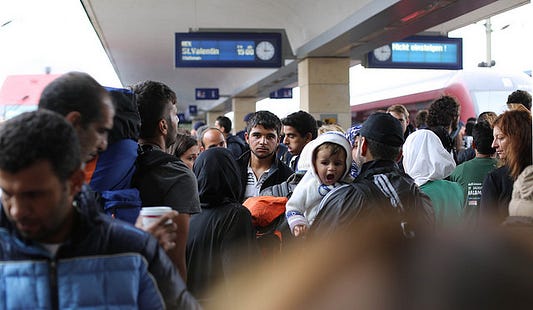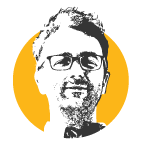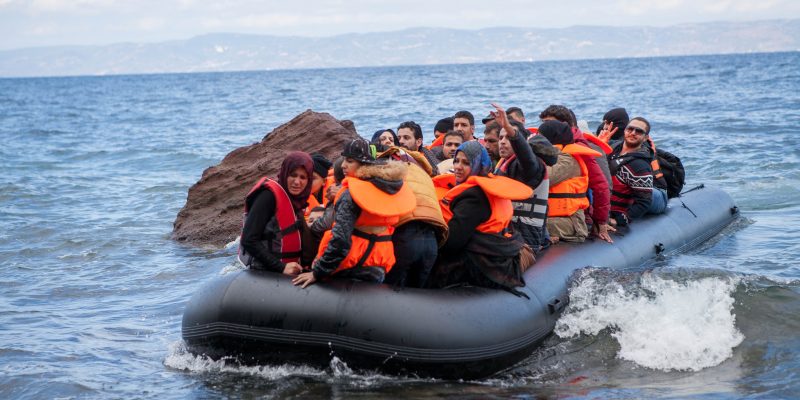1,005,504 “irregular” migrants and refugees arrived in Europe in 2015 according to data collected by the IOM (International Organization for Migration) as of December 21st: 816,752 of them in Greece, 150,317 in Italy. Europe had not seen such large numbers of migrants since World War II.
Why did they come to Europe? They are mostly Syrian victims of civil war, followed by Afghans, Eritreans and Iraqis who were also fleeing decade-long conflicts and repressive governments.
Nevertheless, these numbers, however impressive, are dwarfed by those recorded in the Middle East. There are 2.2 million Syrian refugees in Turkey, 1.1 million in Lebanon and 633,000 in Jordan. In these countries, the overwhelming majority has not been granted the most fundamental rights, such as access to legal employment. In this scenario, their last chance for a decent life is to try to get to Europe and gain access to the protection of such rights as granted by the Geneva Convention of 1951.
Additional figures paint an even more tragic picture. This year alone there were over 3,200 recorded deaths at sea off the coasts of Greece, Turkey and Italy. 700 of them were children.
These numbers make the Mediterranean the world’s deadliest border.
We only remember the name of one child: 3-year- old Aylan whose body washed ashore in Bodrum, Turkey. The images shocked the world. All the others live on only in the memories of their surviving relatives.

2015 will be remembered, among other things, as the year of refugees. We will hear these numbers repeated often in the days to come, but however dramatic, even tragic, they will not change things.
We believe that in order to change the policies that force these people to risk their lives in the hope of finding a slightly better one we need to change the global narrative on migration phenomena and the people involved in them. #openmigration is our contribution towards that goal. Beginning with the data, we will try to explain who they are and give them a face, bringing you the stories of people like us, people that fate simply put on the other side of our borders.
Regardless of the different views on the issue, there is a general, widespread lack of knowledge about the actual data, the global dynamics and the reasons behind the migratory flows that have been created by poverty and war. This situation has been made worse by a media landscape that often manipulates the facts, the result of which is chronic misinformation that can only stir up fear, intolerance and further violations of fundamental rights.
These tragedies at sea that have claimed the lives of those trying to reach Europe are causing outrage and solidarity — but also alarm, indifference and racism — from the public as well as the political class. This is why we want to provide a rigorous, independent outlet for a balanced, “humane” debate on one of the most crucial and controversial crises of our time. Our goal is not just to defend the rights denied to millions of people, but to contribute to the social and economic future of Europe as a continent, a continent that is being swept by populist, racist rhetoric which, in turn, is largely echoed in the media.
We called it “open” to emphasize the values of respect and inclusion and as a necessary reference to the need for transparency regarding data and information on this issue. This is imperative if we are to hold governments accountable in matters of global migration and the push for migration policy reform with a focus on people’s dignity and fundamental rights.
We want to look at the issue in all its complexity, take active part in the debate and, whenever possible, contribute to it by providing the media, the political world and citizens and organizations with effective tools for understanding and advocacy. In order to do so, we will be relying on the expertise and passion of those organizations which gravitate around CILD as well as on a group of Italian and international experts.
Aware of the task ahead, we are also open to strategic collaboration with anyone willing to help.
Our ultimate aim is to build a wider advocacy platform around #openmigration — which can foster change in Italian and European migration policies — while keeping our gaze focused on the great social, economic and cultural challenges that await Italy and Europe as a whole.
HEADER PICTURE: CAFOD Photo Library / Flickr Creative Commons.










